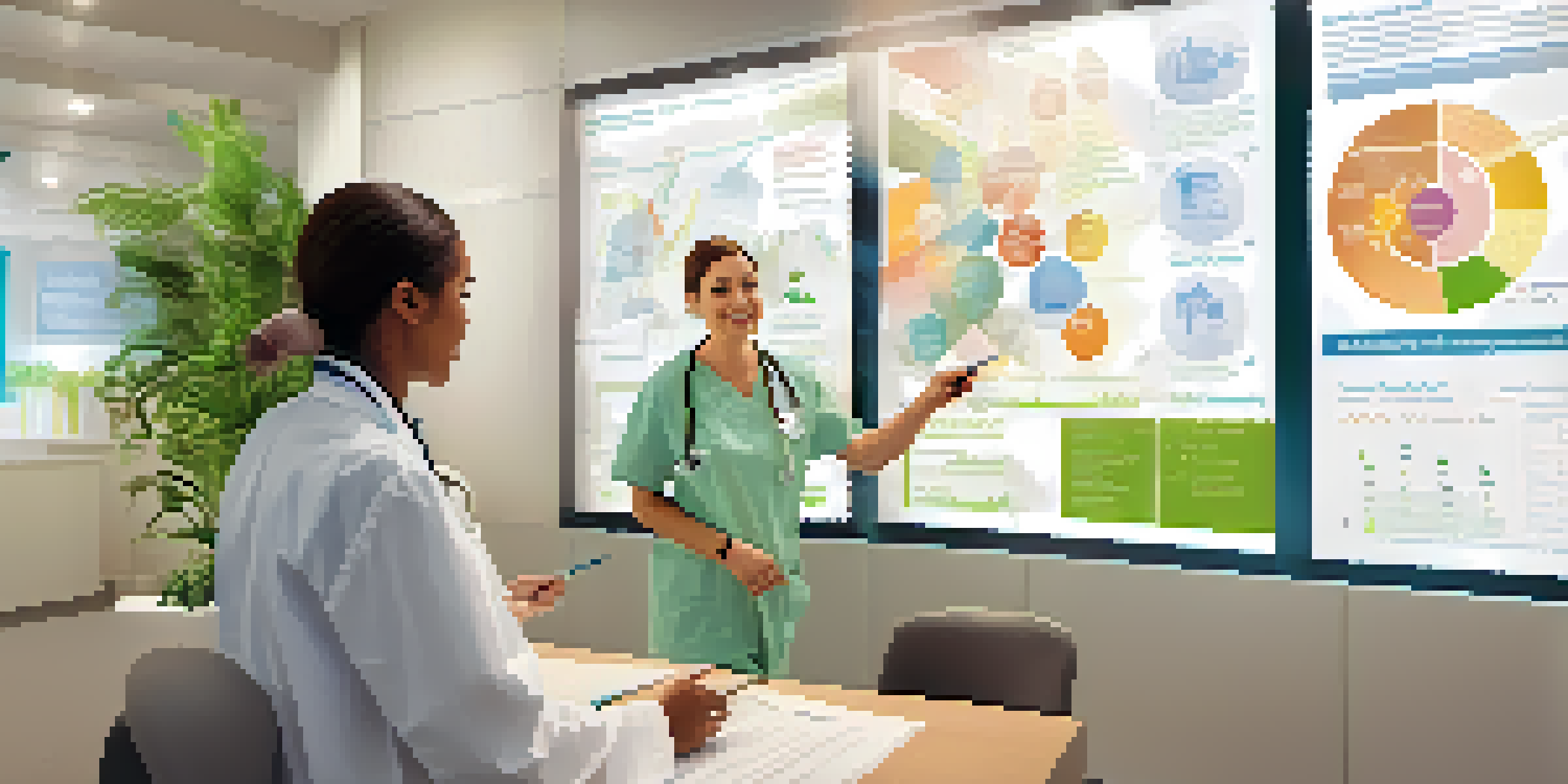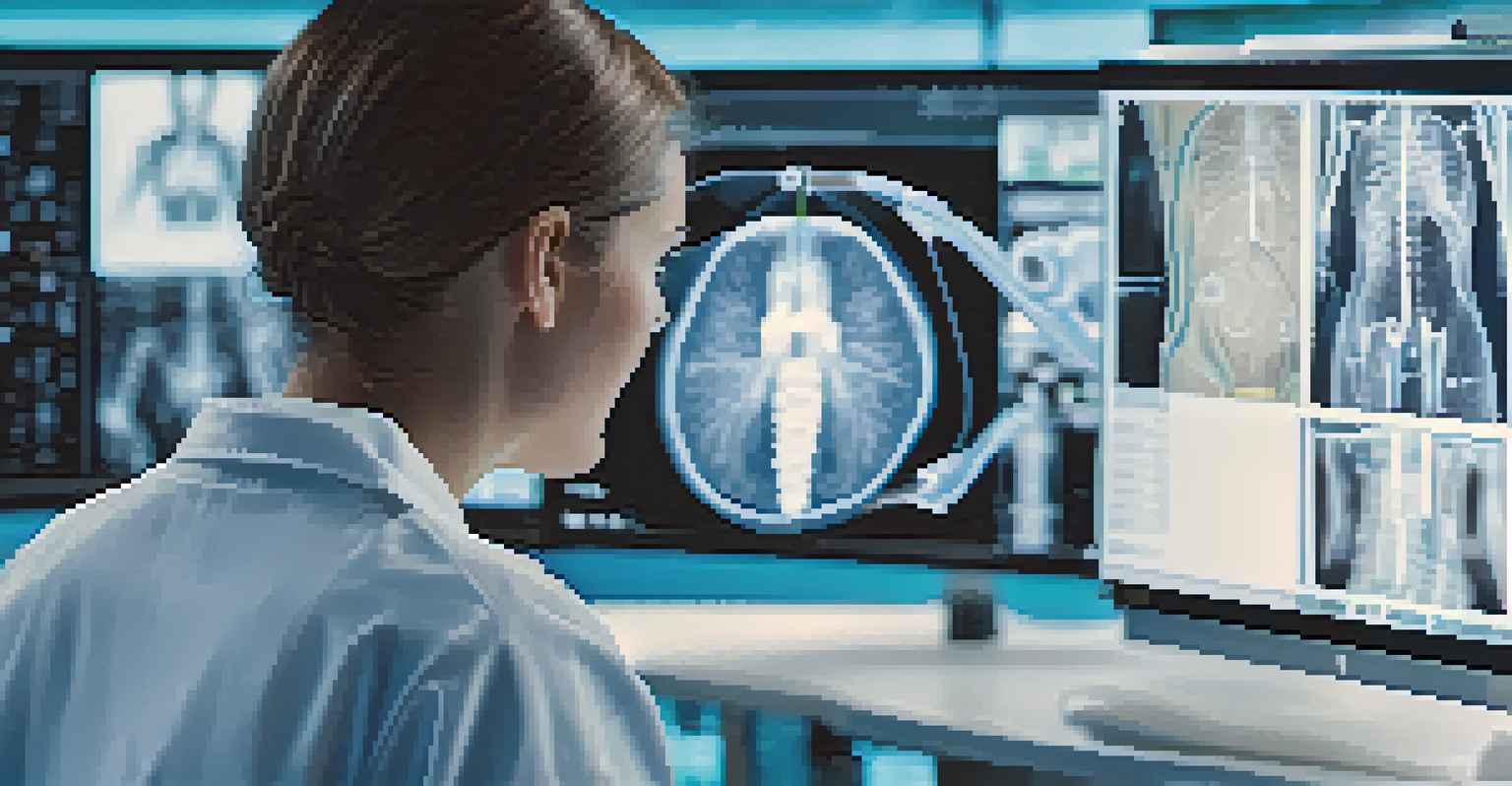The Importance of Early Cancer Diagnosis for Better Outcomes

Understanding the Impact of Early Diagnosis on Cancer Care
Early diagnosis of cancer can drastically change the trajectory of a patient's treatment. When detected in its initial stages, many cancers are more treatable and manageable, leading to higher survival rates. For instance, breast cancer diagnosed at stage one has a 99% five-year survival rate, compared to just 27% for stage four.
Early detection is the key to successful treatment.
By catching cancer early, healthcare providers can implement treatments sooner, which often leads to less aggressive therapies and better quality of life for patients. This not only helps in physical recovery but also alleviates emotional stress for both patients and their families. Early intervention can make the journey through cancer less daunting.
Furthermore, early detection often means fewer complications during treatment. When cancer is caught before it spreads, the options for treatment are typically broader, allowing for personalized approaches that can enhance the overall effectiveness of care.
The Role of Screening Programs in Early Detection
Screening programs play a crucial role in identifying cancer at an early stage, even before symptoms appear. Regular screenings, such as mammograms for breast cancer or colonoscopies for colorectal cancer, can catch abnormalities that may indicate cancer. This proactive approach can be lifesaving, as many cancers develop silently without noticeable symptoms.

For example, the American Cancer Society recommends that women begin annual mammograms at age 40, as early detection is key in reducing mortality rates. By participating in these programs, individuals take an active role in their health, which can lead to better outcomes and more informed health decisions.
Early Diagnosis Saves Lives
Detecting cancer early significantly increases survival rates and improves treatment options.
Moreover, public awareness campaigns about the importance of these screenings can encourage more people to participate. Education about risk factors and the benefits of early detection can empower individuals to seek out these vital screening services.
The Emotional and Financial Benefits of Early Diagnosis
Catching cancer early doesn't just save lives; it also alleviates the emotional burden associated with a late-stage diagnosis. Knowing that cancer is identified early can provide a sense of control and hope for patients and their families. This emotional stability can enhance the effectiveness of treatment, as a positive mindset often contributes to better health outcomes.
The earlier we can catch cancer, the better chance we have for successful treatment and recovery.
Additionally, early diagnosis can lead to significant financial savings. Treating advanced cancer often requires more intensive therapies, longer hospital stays, and more expensive medications. By addressing cancer in its early stages, patients may face lower healthcare costs, which can relieve some of the financial strain during an already challenging time.
Ultimately, early diagnosis promotes a holistic approach to cancer care, where emotional and financial factors are considered alongside physical health. This comprehensive perspective can lead to more favorable outcomes for patients navigating their cancer journey.
Barriers to Early Cancer Diagnosis and How to Overcome Them
Despite the clear benefits of early diagnosis, several barriers can prevent timely detection. Factors such as lack of access to healthcare, socioeconomic disparities, and even cultural stigmas can hinder individuals from seeking necessary screenings. Addressing these barriers is crucial to improving overall cancer outcomes.
For instance, community health initiatives can help bridge the gap by providing free or low-cost screenings in underserved areas. By increasing access to these essential services, more people can be encouraged to prioritize their health, leading to earlier diagnoses.
Screening Programs are Vital
Regular screenings can identify cancer before symptoms appear, leading to better health outcomes.
Additionally, increasing awareness and education about the importance of early detection can empower individuals to take charge of their health. When people understand the risks and benefits associated with early diagnosis, they may be more inclined to seek out screenings and check-ups.
How Technology is Advancing Early Cancer Detection
Advancements in technology are revolutionizing the way we detect cancer early. Innovations such as liquid biopsies and artificial intelligence (AI) are making it possible to identify cancer markers in the bloodstream or analyze imaging more accurately. This not only speeds up the detection process but also enhances the precision of diagnoses.
For example, AI algorithms can analyze mammogram images to detect abnormalities that human eyes might miss, leading to earlier interventions. These technological breakthroughs are not just improving detection rates; they’re also making the screening process less invasive and more accessible to a wider audience.
As these technologies continue to evolve, they hold the promise of further reducing the time between detection and treatment. With ongoing research and investment, we can expect even more innovative solutions to emerge, making early cancer diagnosis more efficient and effective.
The Role of Healthcare Providers in Encouraging Early Diagnosis
Healthcare providers play a pivotal role in promoting early cancer diagnosis through regular check-ups and patient education. By encouraging patients to discuss their risk factors and family histories, providers can identify those who may need additional screenings. This proactive approach can make a significant difference in catching cancer at its earliest stages.
Moreover, healthcare professionals can help demystify the screening process and address any fears or misconceptions patients might have. By fostering an open dialogue, they can reassure patients about the importance of early detection and the steps involved in the screening process.
Barriers Must Be Addressed
Access to healthcare and education about early detection are crucial for improving cancer diagnosis rates.
Ultimately, when healthcare providers take the initiative to prioritize early diagnosis, they empower patients to take charge of their health. This collaborative effort can lead to improved outcomes for everyone involved.
The Future of Early Cancer Diagnosis and Patient Care
Looking ahead, the future of early cancer diagnosis is bright, with ongoing research and innovation paving the way for enhanced detection methods. Scientists are continually exploring new biomarkers and technologies that could further improve our ability to catch cancer early. This progress could redefine what we understand about cancer screening and treatment.
In addition, the integration of personalized medicine is likely to become more prevalent, allowing for tailored treatments based on an individual's unique cancer profile. This approach can lead to more effective therapies and better outcomes for patients, as treatments can be customized to meet their specific needs.

As we continue to prioritize early cancer diagnosis, we can anticipate a shift towards more holistic and patient-centered care. By embracing advancements in technology, education, and community outreach, we can work together to improve early detection rates and ultimately save lives.